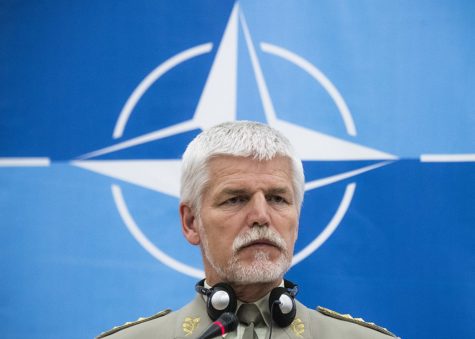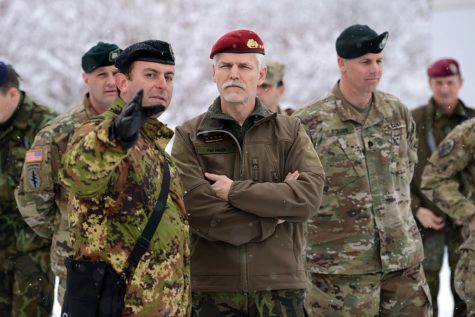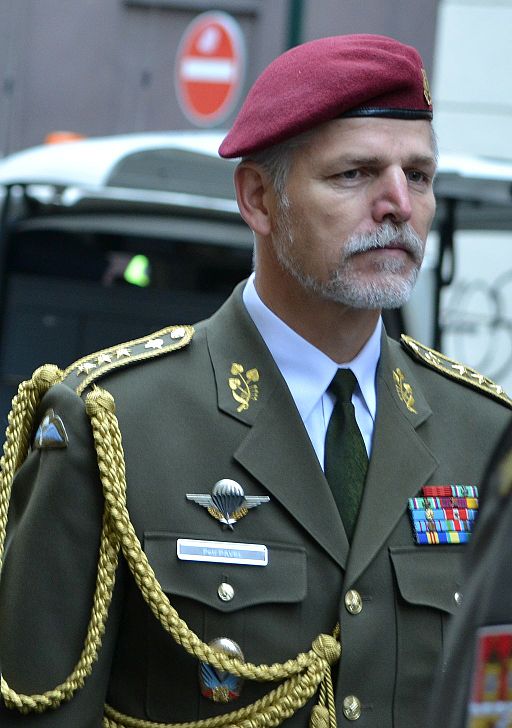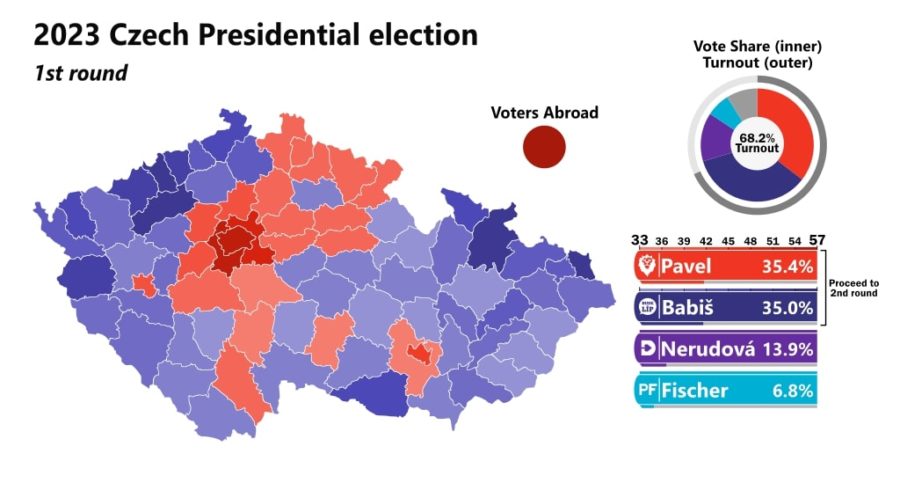Meet Petr Pavel: The New Czech President and an Interesting Example of Populism
A profile of a former general nominated by the people, who won 58.3% of the vote.
David Sedlecký, CC BY-SA 3.0
Petr Pavel, age 61, is the President Elect of the Czech Republic who took office on March 9th, 2023. He is a former Czech general who was nominated by the people as an independent, but he holds no prior political experience.
The political landscape in the Czech Republic changed on January 28th, 2023, when Petr Pavel was elected as the new president. A former general and man who was nominated by the people, he is an interesting mixture of populism with Western establishmentarian policies. With the support of more than half of the country behind him, Pavel assumed office on March 9th, 2023, after a period of transition from former president Miloš Zeman.
Pavel announced his campaign on June 29th, 2022 after reaching the required 80,000 signatures. He began his campaign three months later on September 6th, 2022 with his slogan “Vraťme Česku řád a klid” which, in English, translates to “Return order and peace to the Czech Republic,” a fitting quote for a man with such an extensive military background.
To better understand Pavel and his campaign, it is important to look back on his career and how it shaped his political views.
Early Military Career in the Czechoslovak Army
Petr Pavel entered military service in 1983 after completing military high school and then a military academy in Brno. At first, he was just a simple paratrooper, a soldier who drops from a plane into combat, but soon enough, he rose up the ranks to the role of a platoon leader.
Two years later, Pavel joined the Communist Party of Czechoslovakia. However, he eventually grew discontent with the ideology and aligned himself with notable dissidents during the 1989 Velvet Revolution, which was the non-violent transition from communism to democracy. Afterwards, Pavel officially joined the democratic movement.
He continued to pursue higher military education and enrolled in military university. His service education took him around the world, and he attended multiple institutions throughout Europe and America, eventually graduating with a Master’s in international relations from King’s College. Pavel would return to the military, now working in intelligence. His impressive education allowed him to rise through the ranks of the Czechoslovak Army.
Service with the United Nations
After his return, Pavel became a member of the 1st Czechoslovak Battalion for the United Nations Protection Force in Bosnia. He served during the Bosnian War and contributed to the international alliance against the Serbians.
Notably, Pavel led the evacuation of Karin Base, a French military base under siege by Serbian forces after the French had been unable to evacuate due to the damaged bridges and war torn infrastructure in the region. Pavel and his troops were 30 kilometers away from the French, so the United Nations sent the platoon to help evacuate. With 29 soldiers under his command and two armored personnel carriers, Pavel crossed the territory while under enemy fire. When he arrived, two French soldiers had been killed and many others were injured. In the end, he was able to evacuate 55 people from the base, earning him commendations from the French and Czech governments.
Time in Military Management and NATO
After his time with the UN, Pavel served in many positions abroad, first as a military attaché and eventually settling in as a representative of the Czech Republic for NATO from 1999 to 2001. Through these experiences, Pavel developed military sensibilities and the ability to navigate the international community. Furthermore, working with the U.S. in their War on Terror allowed Pavel to show his military fortitude in the international community.
In the next decade Pavel rose up the ranks in the Czech military, becoming brigadier general in 2002, major general in 2010, and lieutenant general in 2012. During this time, he had a seat on the defense committee that wrote the White Book on Defense, a key form of policy which shaped Czech defense policy. In 2012, he was eventually promoted to Chief of Staff after a brief stint as the Deputy Chief a few months prior. Executing the duties of his office, he collaborated with members of the military and academics in the field of science to politics on ways to work on improving the country’s defense capabilities.

In 2014, Prime Minister Bohuslav Sobotka of Czechia and his cabinet nominated Pavel for Chair of the NATO military commission. He was then elected to the position, becoming the first member from an ex-Warsaw Pact country.During his time as commissioner, Pavel took some important decisions in shaping NATO policy. Most importantly was his re-establishment of diplomatic communications with Russia, which had been destroyed during the illegal annexation of Crimea earlier in the year. However, despite helping to foster a better relationship with Russia, Pavel still remained wary of further Russian aggression.
In 2018, his time at NATO came to an end. After four years of service he had made his mark on the organization and was given military honors.
Pavel Post-Military
Pavel retired from military service in 2018. He began working for consulting firms and lecturing at several think tanks and organizations around the world, the most notable being the Aspen Institute. Through this, he was able to share his expertise on military and current event issues.
Pavel is an active member of Czech Society and strives to improve it. In 2019, Pavel, along with Petr Kolář, František Vrabel, Radek Hokovskýhe, founded “Pro bezpečnou budoucnost,” (For a safe future) as a way to more effectively reach those who needed help in Czech society. Under this association, he launched Spolu silnější in 2020, which fought against the COVID-19 Pandemic in Czechia. The program means “Stronger Together,” and it accomplished exactly that through crowdfunding, volunteering, and supporting frontline workers. Through these programs, Pavel was able to meet with elected officials on how to deal with the pandemic and even proposed a crisis plan to Prime Minister Andrej Babiš.
Running for Office
In the years before the 2023 election, the coalition of leftist parties (Spolu) met to decide who they would consider sponsoring for the 2023 election. Spolu is a political alliance of TOP 09, KDU-CSL, and the Civic Democratic Party. Because Spolu currently governs the Czech Republic’s legislature, their nomination for the election was a very important decision. Though Spolu made no official decision at the time, Pavel was the most discussed candidate at that meeting.
Pavel faced the challenge of being an independent candidate. Under Czech law 50,000 citizen signatures are required to run for office; Pavel received 81,000, more than enough to run. On June 29th, 2022, he was endorsed by Spolu, who announced his candidacy.
His major opponent was Andrej Babis, the former Prime Minister who had been under scrutiny for a myriad of controversies. Some consider his biggest scandal to be his stepping down in 2021 due to fraud accusations by the EU. Despite being acquitted, the incident has negatively impacted his reputation.

Running on his campaign of “Vraťme Česku řád a klid,” Pavel quickly drew the attention of the general public as a reliable official who would turn the page on corruption in public offices. Through his non-political — and instead military — background, he seemed more trustworthy to Czech citizens than the typical politician. The popularity of the Czech military within the population certainly helped Pavel’s chances, with three-quarters of the population supporting the military.
Pavel used typical populistic strategies to support his anti-populist campaign while still appealing as a regular man. Though he does not support anti-establishment ideas, he does appeal to people through his “every man” image in his campaign, with one viral photo of him carrying a keg of beer on his back while hiking up a mountain. This image spread to his supporters’ attire, who would wear flannel to his rallies to show support for Pavel’s platform and emulate his flannel attire.
In the first round of the election, against three opposing candidates, he won 35.4% of the vote, with most of the votes concentrated in the larger cities of Prague and Brno. Pavel continued to garner support through his campaign around the country. He would express many pro European, and pro Atlantic ideas, spousing support for Ukraine and opposing oppressive regimes around the world. Pavel’s campaign championed values which were aimed to bring the Czech Republic back to basics as a reliable partner in Europe’s political theater.
By the second round, Pavel had won 58.3% of the vote, beating out Babis who had 41.7% of the vote. Pavel’s platform and campaign had even won the hearts and votes of Czechs abroad, winning 95.2% of foreign residential voters. Pavel was declared winner on January 28th, marking a change in Czech politics. Pavel is the Czech Republic’s second military president, and his election was celebrated by the international community. After his election he received congrats from the Slovenian president, the Polish and the Ukrainian for the prospects he has in European politics.
Pavel took office on March 9th, 2023.
Pavel and Populism
After defeating Babis, Pavel has been hailed as part of a wave that is toppling old school populism. Populism is defined by Oxford Languages as “a political approach that strives to appeal to ordinary people who feel that their concerns are disregarded by established elite groups.” However, Pavel himself shows an interesting case for Populism, as a man with no prior political experience who was nominated by the people and now leads his country with an overwhelming majority.
By contrast, his populism is one that, instead of opposing the establishment, reinforces the establishment despite not being a part of it. Working for the military imbued Pavel with a sense of order and loyalty for his country. So, he was the perfect challenge to Babis’ anti-political populism with his sense of purpose to bring the Czech Republic as a partner in European democracy. Despite Pavel’s parallels to populism, he still is an important individual in opposing the dangerous tide of anti-democratic populists who have risen in Europe in the past decade. His election seems to be a sign for a better future not only for Czechia but for Europe as a whole.
Pavel’s Platform
Pavel is officially a center-right candidate in Czech politics but holds many liberal viewpoints. Despite some conservative mentalities, he advocates for greater civil growth and opportunity in the Czech Republic for everyone.
Having worked for the military and NATO, Pavel holds many pro-Western and Atlanticist viewpoints. He wants the Czechs to be effective allies in the European sphere and active members in both the EU and NATO. As a result, he advocates for a strong military but not necessarily meet the 2% NATO spending quota just because it is there, instead focusing on spending the necessary resources to make sure the military is modern and equipped to fulfill Czech interests. He also supports NATO and EU interests in Ukraine, advocating for military support, EU and NATO membership and even aiding Ukraine during their eventual post-war reconstruction.
On the topic of immigration, he offers a very vague answer on his website claiming that illegal immigrants are a serious issue that threatens the country. However, he believes it is important to support those fleeing war and support migrants to effectively contribute to Czech society. Pavel believes that migration should be allowed but controlled, thus preventing situations of extreme political division.
Some of his most important liberal policies include legalizing gay marriage, legalizing adoption for gay couples, legalizing abortion, and expanding opportunities for women. He advocates for environmental policies and expanding civil opportunities for all Czechs. His policies highlight his difference from former president Miloš Zeman which Pavel is very proud of.
Some unique policies and positions Pavel holds is his support of euthanization, commonly known as assisted suicide, as he believes it is a fundamental right. Looking to Switzerland as an example, he believes that every person should be able to retire in peace, and, if they are in pain or suffering, it is their right to euthanize. However, he does not support the death penalty, as it is not right to forcibly take a criminal’s life. Instead, he plans to institute more strict laws surrounding repeat offenders.
His Time as President so Far
Since taking office, Pavel has upheld his promises, taking steps towards his vision for the Czech Republic.
On March 14th, 2023, he made his first international trip as president to Slovakia and met with high ranking officials in the government: President Zuzana Čaputová, Prime Minister Eduard Heger and Speaker of National Council Boris Kollár. It was an important first visit as President because of the countries’ history together. His visit was a sign of unity between two countries honoring their shared past.
On March 16th, 2023, he met with Polish President Andrzej Duda and Prime Minister Mateusz Morawiecki, strengthening relations that prior administrations had weakened.. They also spoke of issues regarding Ukraine and their country’s roles in the conflict.
On March 21st, 2023, he visited Germany and met with German President Frank-Walter Steinmeier and Chancellor Olaf Scholz. Pavel praised German-Czech bilateral relations and Germany’s important role in inter-European cooperation. The two countries are close allies, with Germany being Czechia’s largest business partner in Europe. This meeting was a signal of a continued strong relationship with Germany.
As of right now, Pavel and Slovak President Čaputová are planning a joint visit to Ukraine to meet President Zelensky. Pavel had been outspoken in his support for Ukraine in their ambitions to join the EU and NATO and is in support of the war effort with aid to Ukraine to fight Russian anti-democratic influence in Europe.
In terms of the home policy, Pavel does not exert direct control, since he is head of the State but not the government. Pavel as the President leads the country, but the PM leads the government as leader of the legislature. Due to this Pavel does not have a direct control of what happens in the legislature; however, he does have influence with his position and can sign any bills which come through his office.
Although we are only a few months into Pavel’s presidency, given his experience and dedication to the Czech Republic his history suggests he has the potential to bring the country back from a period of populist isolationism to a key player in European geopolitics. Not just a man of the military but a man of the people, Pavel’s future seems promising so far.
Working for the military imbued Pavel with a sense of order and loyalty for his country. So, he was the perfect challenge to Babis’ anti-political populism with his sense of purpose to bring the Czech Republic as a partner in European democracy. Despite Pavel’s parallels to populism, he still is an important individual in opposing the dangerous tide of anti-democratic populists who have risen in Europe in the past decade.
Gabriel Marinescu is the Arts and Entertainment editor for ‘The Science Survey.' He enjoys the fact that journalism allows you to convey the facts in...












